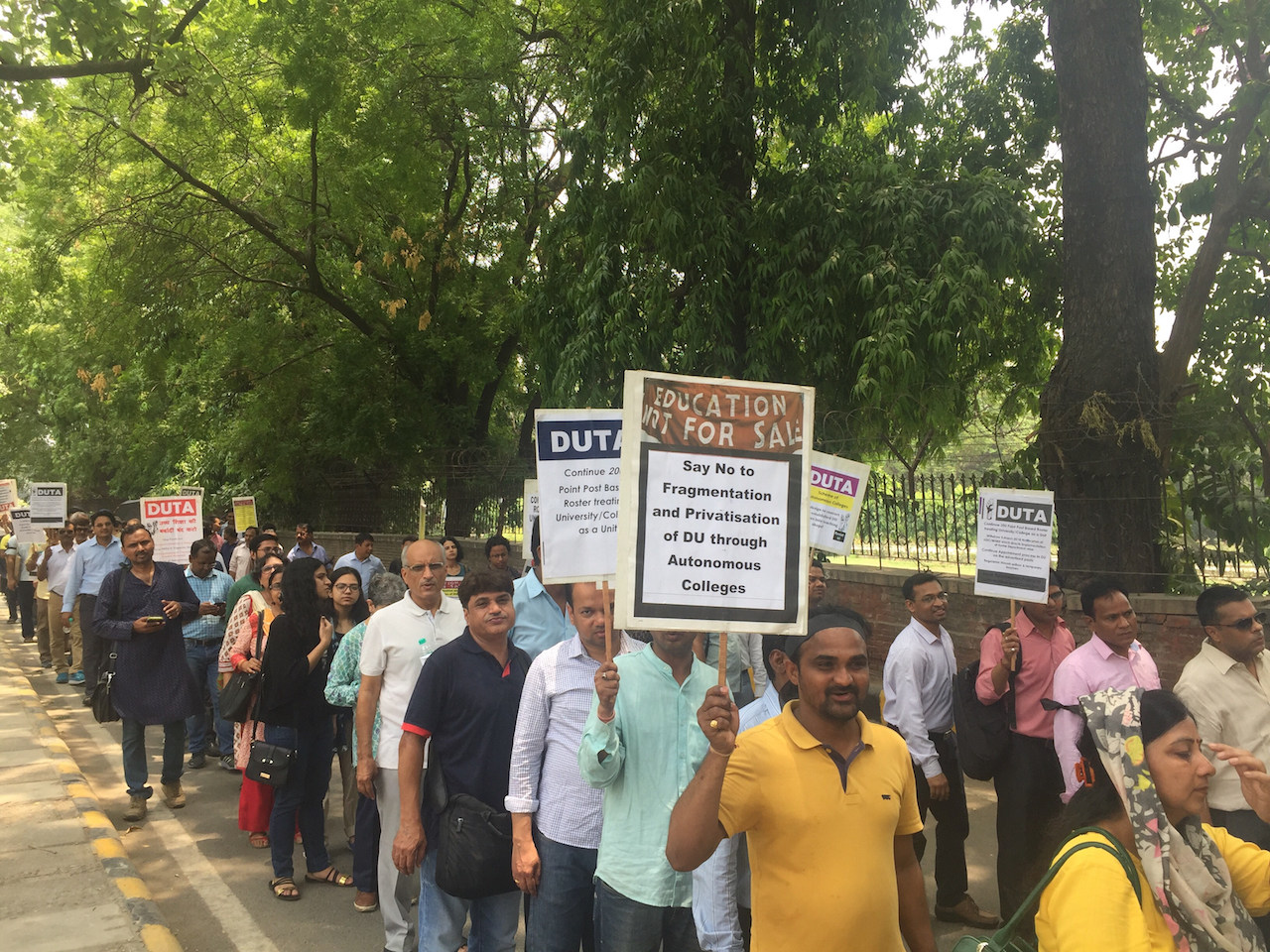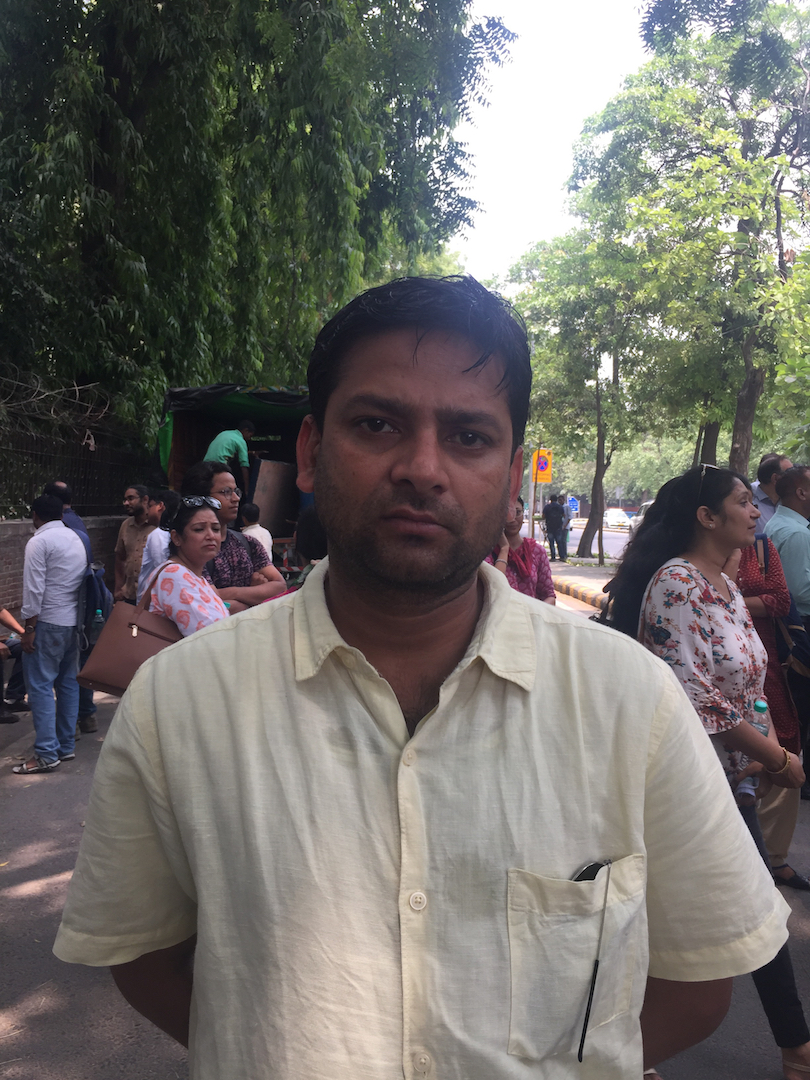Laxman Yadav has been teaching in the Department of Hindi at Zakir Husain Delhi College for eight years now. But at the end of every semester, he prepares for an interview, hoping he’ll make it. It’s not for a new job though. The interview is for the same job—ad-hoc lectureship—at the same college, in the same department.
If a new order from the University Grants Commission (UGC) comes into effect from July 15 this year, Yadav, having suffered the travails of being an ad-hoc teacher, might not be rehired. He doesn’t know know if he still has a job at the end of summer vacations.
Videos by VICE
About 4,000 Delhi University ad-hoc teachers could lose their jobs if the UGC order becomes a reality, which many teachers fear will also reduce the number of reservation teaching posts in college departments across the country.
The Delhi University Teachers Association (DUTA), founded in 1948, is protesting this order along with teachers from various DU colleges. Today they gathered near the Embassy of Nepal in Mandi House in Delhi. In fact, the teachers have been registering their protest since May 9 when they decided to boycott evaluations. The protests have been going on for a few weeks now.

On March 5, the University Grants Commission had asked all universities and colleges across the country to change the reservation roster for teaching posts in each college. This means that the number of reserved faculty posts across universities and colleges shall now be calculated department-wise and not college-wise. A good example to illustrate this is Banaras Hindu University, where, according to one report, teaching posts for Scheduled Caste candidates will reduce by 59 percent, for Scheduled Tribe by 80 percent and for Other Backward Classes by 29 percent.
“The number of teachers from Scheduled Caste, Scheduled Tribe and Other Backward Classes would drastically reduce if this order is implemented in colleges,” Najma Rehmani, treasurer of DUTA told VICE. “This order will make sure that there are hardly any candidates from marginalised communities in higher academia.”
Rajib Ray, president of DUTA and the Federation of Central Universities Teachers’ Association spoke to VICE about the issue. “There are about 9 lakh teacher posts in our country right now. If the reservation roster order comes into effect, it will affect at least 25 percent of that number. Teachers, from all categories, will be displaced. This change will especially have a huge impact on the faculty of smaller departments of colleges.”

Earlier each college was treated as a unit and reservation for teaching posts was calculated according to that. The latest order will make each department of a college a unit. Gyan Prakash from Vivekananda College explains. “There are currently six reservation posts in Department of Hindi [in Vivekananda College]. The new ruling will reduce it to only three.”
Luv Kush, teacher at Ram Lal Anand College says of the new order UGC, “Social justice ki dhajjiya ud jayenge.” He also had some personal concerns, like many young ad-hocs present. “There is no job security. I can lose my job. How can one get married like this?”
At the protest today, slogans of “DUTA, March on” and “Vice Chancellor, Down, Down” drowned the noise of traffic. Teachers congregated, many of them sporting black bands on their foreheads and forearms—hence called ‘Kali Patti Rally’. A female DU ad-hoc teacher from Shyam Lal College who didn’t want to be identified fearing harassment from permanent faculty at her college told me, “I’ve been teaching for the last two and a half years. DU advertised teaching posts 1.5 years ago according to the older roster rules. There was hope for ad-hocs appointed at that time that they’ll be made permanent. Now those appointments have also been halted.” She continued, “Especially, for female ad-hoc teachers, it is so difficult. We don’t get any maternity leave. I can’t plan my family. There is also no growth trajectory.” She also has to appear for an interview after every semester. “It is like the system doesn’t want to absorb us.”

Another teacher at the protest, Pooja Thakur, from Ramjas College told us, “Ad-hoc policies are extremely bad. We are fighting for all the teachers. There are no perks. We are appointed for 120 days. Then interview again. It is harassment. There is no maternity leave either.”
The Supreme Court also upheld this reservation roster policy. However, the human resource development ministry filed a Special Leave Petition (SLP) in Supreme Court in April. Hearing is on July 7.
One of the teachers from Kamla Nehru College, Shobana Warrier, who was at the protest despite holding a permanent post explained her stance, “Reform in education is a serious business. This will jeopardise careers of so many teachers.”
An hour and a half later, there were more placards, more people. The protesters soon started walking towards Parliament Street. They hoped to meet the Vice Chancellor later today. Beads of sweat framed many faces. Traffic swarmed around. And the police kept a close watch.
Follow Maroosha Muzaffar on Twitter .
More
From VICE
-

Screenshot: Valve, Micron -

JB Lacroix/FilmMagic -

Screenshot: Illfonic -

